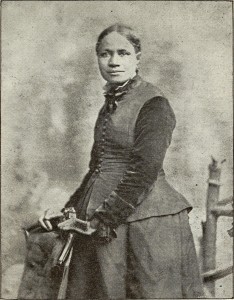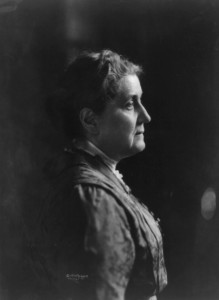Moving Toward Freedom
March 31, 2016Frances Ellen Watkins Harper was born a free Black woman in Baltimore, Maryland in 1825. She was raised in the household of her uncle, an educator and African Methodist Episcopal (AME) minister. He was also an abolitionist—a person who objected to the enslavement of blacks. Harper became an educator and abolitionist as well. She also became a writer, publishing her first book of poetry at twenty and later in life publishing the first short story by an African American woman. Her writing often urged Blacks, women, and people in oppressed groups to take a firm stand for equality and freedom.
In 1850, the Fugitive Slave Act was passed. It became dangerous to be a free Black in Maryland because slave owners could claim Black people were runaway slaves and force them into slavery. So, Harper moved farther north to Ohio and then to Philadelphia. She taught, ran part of the Underground Railroad helping slaves escape to freedom, and lectured around the country.
In 1863, abolitionists celebrated success with the passage of the Emancipation Proclamation, which freed the slaves. But there was a long road ahead to full equality, and Harper spent the rest of her life working for women as well as African Americans to have access to full freedom and justice.
To read some of Harper’s poems click here.
Whole, Not Broken
March 1, 2016Christopher Reeve had everything going for him. He was handsome and athletic and famous for playing Superman in the movies. He had a lovely family and plenty of money that he’d made as a movie star. Really, things could hardly have been better.
Until he was in a horse bock riding accident that damaged his spine and left him paralyzed below his neck. He couldn’t move his hands or feet, let alone play a superhero who could jump tall buildings in a single bound. He was, in a profound way, broken.
But in many other ways, he was deeply whole. He had a family who loved him and believed in him. And he found in his Unitarian Universalism a reminder that one way we can build wholeness for ourselves is by doing what we can to build wholeness for others.
So Christopher and his wife Dana dedicated themselves to trying to make life better for other people who had spinal cord injuries. They raised money to help people get things they needed like ramps and vans that could carry wheelchairs. And they raised money for research that might help people with spinal cord injuries.
Christopher Reeve eventually died from the complications of living with his injury, but his living taught a lot of people about what can be whole when things get broken.
A House for All
February 1, 2016You could argue whether Jane Addams was a Unitarian, since she regularly went to a Unitarian church, but never joined. But you can’t argue about whether she understood the true meaning of hospitality.
Jane grew up in a wealthy family, but when she discovered as a child that many poor people in the cities lived in terrible conditions, she wanted to make a difference. In 1889 she and Ellen Starr founded Hull House, a big house in Chicago which offered a place for the many poor recent immigrants in the city to take part in clubs, discussions, and activities, as we ll as take English and citizenship classes, and enjoy theater, music, and art classes.
About 25 people actually lived at Hull House, and Jane made sure that both wealthier people and poor immigrants lived there together, since she believed that people with different experiences could learn a lot from each other. Jane Addams and the other women who ran Hull House with her created an amazing space of hospitality where people could learn, grow and have fun together. In 1931 she was awarded the Nobel Peace Prize.
Learning More Online:
To learn more about Hull House, and the visionary women who founded it, visit the National Women’s History Museum website. The Jane Addams-Hull House Museum today serves as a living legacy to Jane Addams and her vision of hospitality for all; learn more about their ongoing work at hullhousemuseum.org
An Unexpected Second Chance
January 1, 2016John Murray was a Universalist who certainly took starting fresh to heart. Tragedy struck for Murray when his wife and young son died, and then he was put in jail because he was unable to pay his bills.
In 1770 he felt able to make a totally fresh start, so he got on a ship and headed for the New World, North America. Unfortunately, the ship got stuck just off the shore of New Jersey, when they were trying to get to New York.
But Murray agreed to go on shore and try to find directions and supplies. He ended up on the doorstep of a man named Thomas Potter, who greeted him as the Universalist preacher that Potter had been waiting for!
Well, Murray didn’t have plans to be a Universalist preacher—that wasn’t the fresh start he had in mind. He wanted to go on to New York. But he agreed that if they didn’t get the wind the boat needed to sail on, that he would preach on Sunday about Universalism’s message of an absolutely loving God.
Well the wind didn’t pick up, and Murray did preach, and he ended up making a fresh start by marrying Potter’s daughter and becoming a traveling preacher, spreading the good news of God’s love all over New England.
Renew Your Membership
We invite you to join your fellow CLFers to renew your CLF membership and stewardship of the CLF for another year.
Support the CLF
Can you give $5 or more to sustain the ministries of the Church of the Larger Fellowship?
If preferred, you can text amount to give to 84-321
Newsletter Signup
About
Quest for Meaning is a program of the Church of the Larger Fellowship (CLF).
As a Unitarian Universalist congregation with no geographical boundary, the CLF creates global spiritual community, rooted in profound love, which cultivates wonder, imagination, and the courage to act.
Contact
Church of the Larger Fellowship Unitarian Universalist (CLFUU)
24 Farnsworth Street
Boston MA 02210





